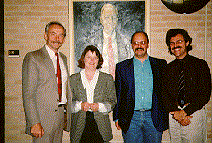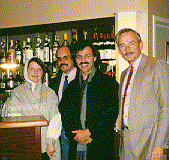 |

Forschung > Netzwerk Psychologische Suchtforschung > Trierer Forschungsgruppe Abhängigkeit und Suchtmittelmißbrauch (TRIAS)
Trierer Forschungsgruppe Abhängigkeit und Suchtmittelmißbrauch (TRIAS)
The "Trierer Forschungsgruppe Abhängigkeit und Suchtmittelmißbrauch" (TRIAS; Trier Research Group on Addiction and Substance Abuse) works together since 1978 and publishes regularly papers about alcohol and drug dependence. The group does not
receive special funding from grant-giving institutions.
Special reference of the published work is made (a) to methodological aspects of research on alcoholism (e.g., taxonomy of relevant concepts; development of large research databases), (b) to the evaluation of therapy (e.g., relapse quotes), and (c) to the diagnosis of addiction. The group has developed some published questionnaires, e.g., Trierer Alkoholismusinventar [TAI], Trierer Inventar für Medikamentenabhängige [TIM], the TAI being the most widely used differential questionnaire for alcohol problems in the German speaking countries. The TAI is currently implemented on PC within the HOTSYS shell by the
Centre for Test Development and
Diagnostics at Fribourg University.
Selected Pictures of the TRIAS Group
 Here you see the
group (from left to right: RS, WF, MK, & JF) standing before the well-known painting of Old Jellinek in the Amsterdam
Jellinek-Centrum Here you see the
group (from left to right: RS, WF, MK, & JF) standing before the well-known painting of Old Jellinek in the Amsterdam
Jellinek-Centrum
and here  they are
doing their research in the field... they are
doing their research in the field...
Selected Publications (only German titles available, sorry!)
Scheller, R., Funke, J., Funke, W., & Klein, M. (2002). 25 Jahre Trierer Forschungsgruppe Abhängigkeit und Suchtmittelmissbrauch (TRIAS). Trierer Psychologische Berichte, 29(5).
Funke, J., Funke, W., Klein, M., & Scheller, R. (2001). Trierer Inventar für Medikamentenabhängige (TIM). Konzeption und erste Befunde. Sucht.
Funke, J., Funke, W., Klein, M., & Scheller, R. (2000). Zur Dimensionalität des "Trierer Inventars für Medikamentenabhängige" (TIM). Trierer Psychologische Berichte, 27(3).
Funke, J., Funke, W., Klein, M., & Scheller, R. (1998).
Überprüfung der faktoriellen Struktur und der teststatistischen
Eigenschaften des "Trierer Alkoholismusinventars" (TAI). Sucht, 44, 34-41.
Funke, W., Funke, J., Klein, M. & Scheller, R. (1987). Trierer Alkoholismusinventar (TAI). Handanweisung. Göttingen: Hogrefe.
Funke, J., Keller, W., Klein, M. & Scheller, R. (1980).
Entwurf eines Forschungsprogramms zur Optimierung der Behandlung von
Alkoholabhängigen. Medizinische Psychologie, 6, 275-292.
|
|


 Here you see the
group (from left to right: RS, WF, MK, & JF) standing before the well-known painting of Old Jellinek in the Amsterdam
Jellinek-Centrum
Here you see the
group (from left to right: RS, WF, MK, & JF) standing before the well-known painting of Old Jellinek in the Amsterdam
Jellinek-Centrum  they are
doing their research in the field...
they are
doing their research in the field...